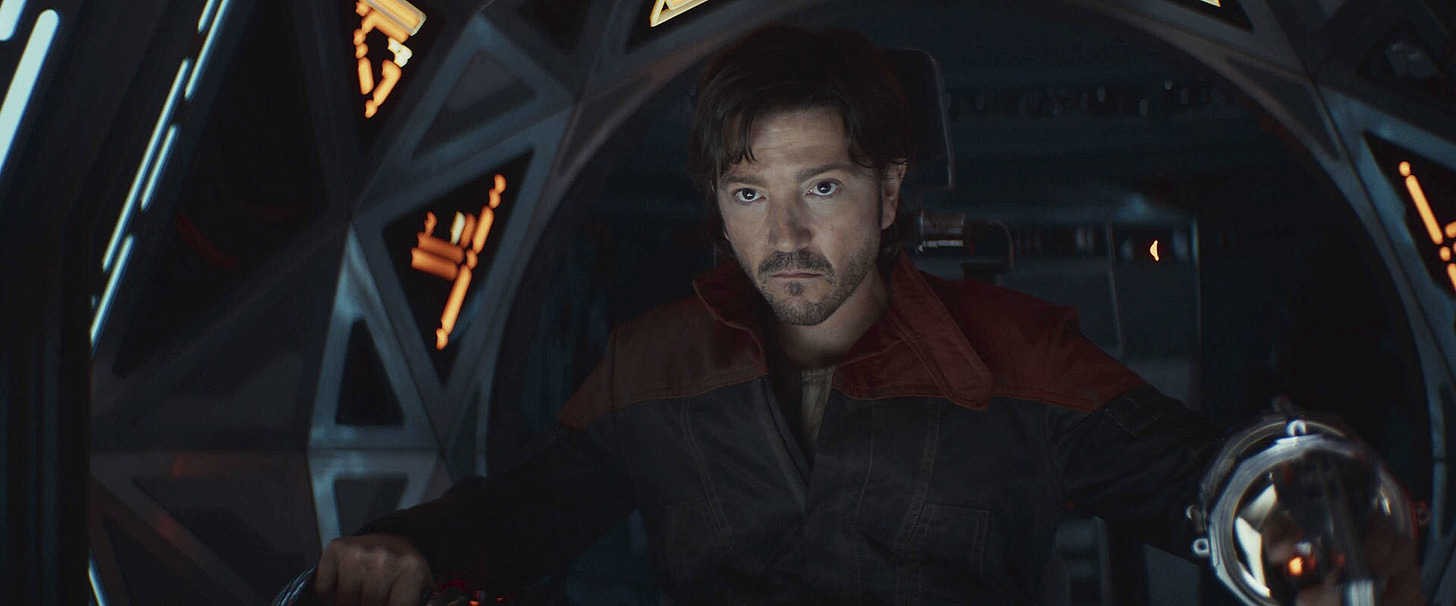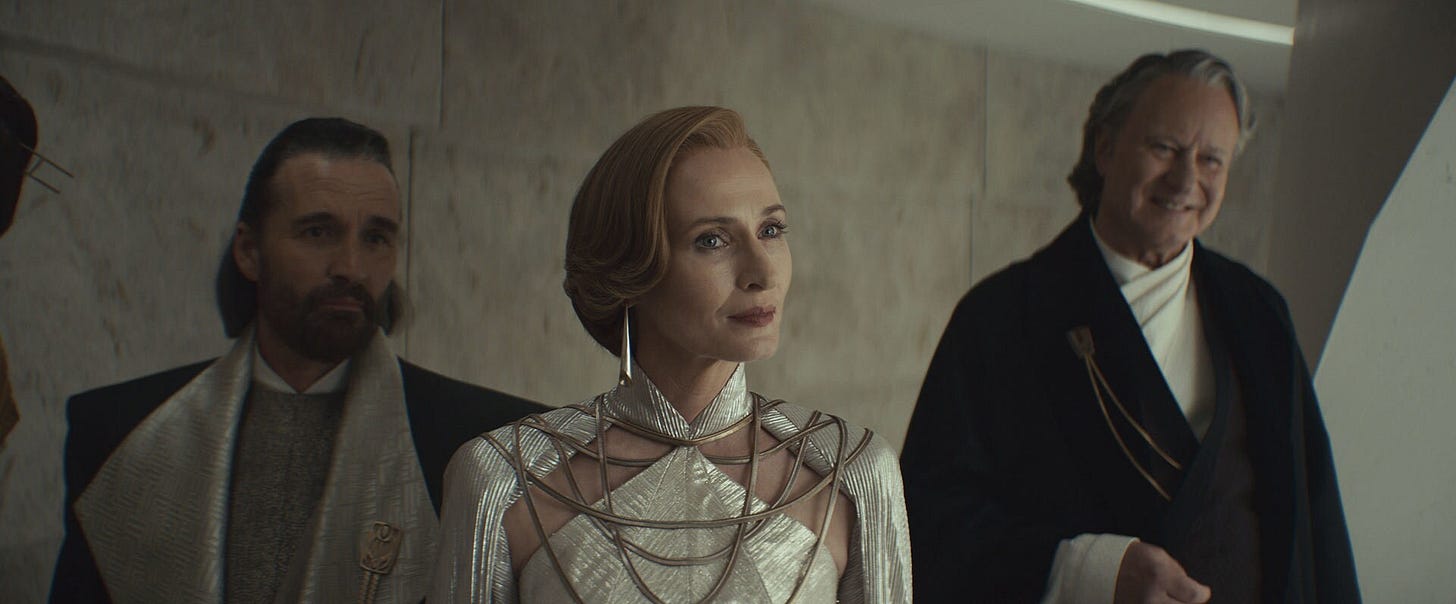Why You Should Watch Andor
Even if you aren't a Star Wars Pervert
“Andor is really good—no, you don’t need to be into Star Wars, really, it’s good, I promise.”
—Me, several times in the last 3 weeks. In the interest of not continuing to repeat myself, I’ve decided to collect my thoughts here, partly as review and partly as pitch for why this show is worth watching.
It’s Not Just For Star Wars Perverts
I am, admittedly, a Star Wars pervert. There was a period in my life when I occupied a traditionally “nerdy-boy” archetype that I really don’t any more, but of all the fictional worlds I became attached to in that period, Star Wars is the one that’s stuck with me the most. I watched all the animated series, obsessively played through the KOTOR games, and I was even once world-ranked in a table-top miniatures game about fleet-scale space battles in Star Wars. That being said, I’d be the last person now to argue that much of this has any real artistic merit. The original trilogy (particularly A New Hope) was a very clever bit of popular cinema, and the rest of the “universe” occasionally throws out gems like KOTOR II and the 2D animated Clone Wars,1 but largely this is slop meant to sell bits of injection-molded plastic. Andor is an exception to this rule.
It was on the way to a tournament for that miniatures game that a friend and I were bemoaning the state of the recent live action Star Wars releases. He quipped, “I love Andor though cause it’s the one Star Wars show I can watch with my normal friends that I don’t have to pause every few minutes and go ‘See that’s Glup Shitto and he’s important because…’ it’s just a good show that they can get into on its own merits.” And that’s one of the things I keep trying to get across. You don’t need to have seen any other Star Wars to understand what’s going on in Andor and enjoy the story. I do think the story is enhanced and made more meaningful in some ways if you’re familiar with the rest of the lore, but Andor still achieves a kind of holy grail for works situated in a larger fictional canon—to enhance and be enhanced by that larger context while still being compelling and understandable all on its own.
So What’s It Actually About?
Andor is a show about revolution, about the types of people who participate in the early stages of a revolution, and especially, I think, about what that participation does to them psychologically. A lot of media that tries to deal with topics like these in a gritty, “realistic” way likes to focus on the costs of war and revolution in the sense of characters’ dead friends and family, on scenes of burned out homes or idyllic childhoods that protagonists can never return to. Andor certainly has that, but it’s much more interested in the internal lives of its characters and how their involvement changes them as people—Luthen’s paranoia that serves to protect him but also increasingly drives away his allies, Cassian being shaped into a revolutionary leader as every other aspect and potential of his life is stripped away, Mon Mothma’s constant anxiety lurking just below the surface and her increasing alienation from her husband and daughter. It’s all so much more compelling than characters centred on some version of “the bad guys killed my family.”
Andor’s villains, too, are extremely engaging in this regard. By and large, they aren’t grandiose ideologues, nor are they ever “evil for the sake of being evil” as so many of the animated Star Wars antagonists are. They each reflect a particular type of person who ends up administering an authoritarian regime. Krenic is personally ambitious, but Partagaz doesn’t seem to care much about his own glory—much less ideology—he’s just ruthlessly good at executing whatever task is in front of him, and he shapes his demesne and subordinates in his image. Dedra, meanwhile, has deeply internalised the idea that the only way she can be safe within this system is to be part of it and climb the ranks. Talking much about Syril would quickly get into spoilers, but suffice it to say that he’s also a very believable portrait of a certain kind of person who occupies the lower rungs of these regimes.
I’ve seen it argued that the show lacks a coherent theory of revolution and how it works, and while I think that’s true, I’m not sure that it needs one.2 The show isn’t terribly interested in the high-level story of the Rebel Alliance’s formation so much as a character analysis of several “revolutionary types of guy”. More frustrating, though, is the omission of any strong portrait of the mass of ordinary people who happily go along with authoritarianism. This group is the foundation for any regime like the Empire, and Syril’s mother just isn’t cutting it as sufficient representation for the mix of grievance, petty self-interest, and cowardice that fuels their politics. On the flip side, I think Andor manages to do a decent job implicitly acknowledging that revolutionaries are just as likely—if not more so—to be privileged intellectuals or class-ambiguous misfits than to come from the actual oppressed masses.
More Than Anything, Andor Cares
“Slop” has taken on a new meaning and prominence in our vocabulary of late, describing everything from low-brow, one-and-done AI image generations to short-form video, and even traditionally produced mass culture. One of the chief hallmarks of “slop” is a lack of care—it doesn’t matter that the hands look weird on the propaganda you asked GPT to make, people will get the point. Everyone knows that Studio Ghibli stills don’t actually look like that, but who cares? Why put in the effort either to adapt that author on his own terms or to seriously deconstruct his work? Just throw in a few minorities and modern story beats along with excessive nostalgic callbacks to the source material and call it a day! So much of live action Star Wars has fallen into this lately; storytelling gets sidelined for characters with no features save for their marketability as toys, shows dwell on homages to other works that ape their form without preserving their meaning, and “big reveals” that don’t so much link stories to the rest of the cannon as reduce characters and silhouettes to tokens—“It’s the back of Yoda’s head! See, we’re doing Star Wars!”
Andor never falls into these traps. From the costuming, to the set design, to the actors’ performances, you get a distinct feeling that everyone involved in creating this actually cared deeply about making something beautiful. References to the rest of Star Wars are subtle and unobtrusive, yet also demonstrate a deep engagement with and appreciation for the canon. Nothing is thrown in just to be cool or to “be Star Wars”, everything has something to say about the character studies or their world. The second season is trying to pack a lot into just 12 episodes, so when we see how Luthen engages with a source we’re getting told a lot about his character, and when Cassian meets a Force healer, that scene does nearly as much worldbuilding as The Acolyte managed to do about a similar topic in its entire season. And, again, the costuming is just incredible.
Ultimately, if you enjoy action or political thrillers, are into sci-fi generally, are interested in the dynamics of revolution and authoritarianism, or just appreciate the craft of television and film, you’ll find something to like about this series regardless of your feelings (or lack thereof) about Star Wars as a whole. For me, it’s been exciting that an element of an admittedly silly and nerdy interest has turned out to be good enough that I feel confident in pitching my friends on it. I’m not terribly optimistic that we’ll see anything quite like this any time soon, but I’m hopeful, at least, that this will cause Star Wars and genre fiction fans in general to expect better.
As well as, perhaps, ~25% of 3D Clone Wars and ~10% of rebels.
The question of whether the Rebellion in Star Wars is a revolutionary or counterrevolutionary force is a rather interesting one. I’ve been known to echo the argument that the OT is less “Midway in Space” than “Waterloo in Space” with Princess Leia and Admiral Ackbar standing in for the arch-reactionaries Wellington and Blucher.



